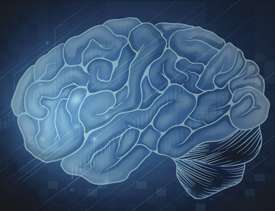New brain mechanism study could advance artificial intelligence

(Medical Xpress)—Research at the University of Reading has provided a new understanding of how our brain processes information to change how we see the world.
Using a simple computer game, akin to a 3D version of the 80s game Pong, the researchers examined how the brain recalibrates its perception of slant in order to bounce a moving ball through a target hoop.
They found that the brain uses an internal simulation of the laws of physics to change its perception of slant in order to 'score' consistently.
The findings provide a unique insight into why humans are such an adaptable and skillful species. With the development of effective autonomous robots, engineers are starting to look at how humans' sensory systems effortlessly achieve what is currently impossible for robotic systems.
The study, funded by the Engineering and Physical Sciences Research Council and the Wellcome Trust, saw participants play a 3D game where they had to adjust the slant of a surface so that a moving ball bounced off it and through a target hoop.
Part way through the game, without telling the participants, researchers altered the bounce of the ball so that the surface behaved differently to the slant signalled by visual cues.
When faced with the altered bounce, participants changed their behaviour to continue scoring points. At the same time, their brain recalibrated their perception of slant - simulating the laws of physics to actually change how the slant looked. In a separate group, making the ball spin eliminated this recalibration.
Dr. Peter Scarfe from the School of Psychology and Clinical Language Sciences, who conducted the study with colleague Prof. Andrew Glennerster, said: "We take for granted our amazing 'adaptability' which allows us to enjoy such past-times as DIY or playing ball sports. However, little is known about the brain mechanisms that enable us to do these activities. Our research shows how our brains appear to have an intimate understanding of the laws of physics. In addition to aiding skillful action, this can change how we perceive the world around us."
The researchers say understanding the basic mechanisms that allow the brain to calibrate sensory information will prove vital in the design of future autonomous robots.
Dr. Scarfe continued: "The human brain exhibits expert skill in making predictions about how the world behaves. For example, a child can bounce a ball off a wall and understand how spinning the ball alters its bounce. However, many of the fine motor skills of a young child are currently way beyond the capability of modern robots. Understanding how sensory systems adapt to feedback about the consequences of actions is likely to be key in solving this problem."
More information: Humans Use Predictive Kinematic Models to Calibrate Visual Cues to Three-Dimensional Surface Slant is published in the Journal of Neuroscience: www.jneurosci.org/content/34/31/10394.full.pdf
















